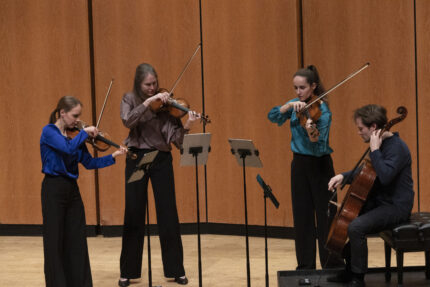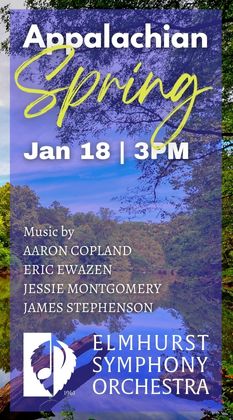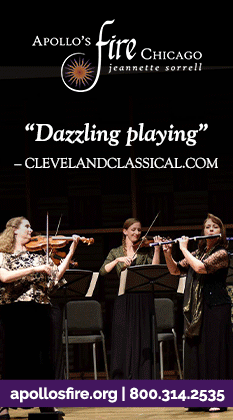Performances
A standout “Amahl” closes the year with warm Christmas spirit
Gian Carlo Menotti wrote of his Amahl and the Night Visitors, […]
Kraemer-led MOB choral program provides customary holiday warmth
Music of the Baroque has put in some Christmas overtime this […]
Mäkelä, CSO wrap the year with bracing contemporary works, Beethoven and Schumann
The final Chicago Symphony Orchestra program of 2025 offered much to […]
Articles
Top Ten Performances of 2025
1. Shostakovich: Symphony No. 11. Jakub Hrůša/Chicago Symphony Orchestra Jakub Hrůša […]
Concert review
Dudok Quartet Amsterdam opens Winter Chamber Fest in style with Schubert, Shostakovich

Northwestern University’s Winter Chamber Music Festival is one a handful of events that provide a spot of uplift through the doldrums of Chicago winter. Now in its 29th year, the festival consistently brings in some of the most reliable international chamber groups.
The Dudok Quartet Amsterdam, who opened the 2026 edition at Pick-Staiger Concert Hall in Evanston Friday night, is one such ensemble. The Dutch quartet has become a mainstay of the series in recent years, with this being their fourth appearance since making their U.S. debut at the festival in 2018.
The Dudok’s past programs have been ambitious and far-ranging, establishing the ensemble stateside as a quartet of uncommon versatility and imagination with a penchant for finding compelling through-lines in their repertoire selection.
Friday’s performance hewed toward the more familiar byways of the string quartet canon, though these selections were no less well-considered in terms of programmatic cohesion.
On the first half was Shostakovich’s String Quartet No. 3 in F Major. Premiered in 1946 at the height of Stalin’s tyranny in the Soviet Union, the movements of the Third Quartet once bore programmatic titles (“The forces of war unleashes,’ “Homage to the dead,” etc.) meant to obscure the ironic tone of the music and shield the composer from scrutiny. The effort was unsuccessful, and after being condemned by the Soviet Communist Party, Shostakovich later stripped the disingenuous epithets.
Cellist David Faber, in his introductory comments, remarked upon language’s flimsy ability to describe experiences, and observed how engaging deeply with Shostakovich’s music (via the Dudok Quartet’s recent endeavor to record all his string quartets) felt like reading the composer’s diary.
The Dudok’s interpretation took on a confessional quality that sympathized with that diaristic view. Shostakovich’s Third Quartet has no shortage of brooding themes that hold an edge when sharpened by a more aggressive approach, but the Dutch quartet’s softer reading revealed an earnest, even tender quality to this music.
For instance, the opening Allegretto leads off with a cheerful-sounding theme colored by unsettling, off-kilter harmonic digressions. Eschewing a more sardonic angle, the Dudok Quartet played this misfit toy of a melody with a sincerity that revealed an undertone of melancholy.
Throughout this performance of the Shostakovich, the Dutch players were at their finest in the work’s diaphanous passages, which brimmed with subtle tension. Such moments in the passacaglia fourth movement wove the canvas on which elegant duets by Faber and violist Marie-Louise de Jong bloomed like watercolors, while at the end of the Moderato, the quartet feathered the edges of the final chord so delicately that the music disappeared almost imperceptibly.
This reading didn’t lack ballast, though. The pounding motif that underpins the third-movement Allegro became more urgent and distended with each successive restatement before finally collapsing under its own weight. The closing Moderato arrives with just enough gravitas to feel inevitable, accruing marginal intensity to earn the chilling, ethereal quietude in the final restatement of the theme at the work’s end — one of the most effective moments of the Dudok’s Quartet’s reading.
After intermission, Schubert’s final string quartet, No. 15 in G Major, told a different kind of tale. Where the Shostakovich entry was intimate, both in scale and interpretation, the Schubert was expansive, even symphonic in scope; the work’s valiant themes and myriad strains of melodic interpolation evoke the trials of the hero’s journey. In her introduction to the work, first violinist Judith van Driel likened the Fifteenth to a journey that, at its end, reveals “your life has changed, but you don’t really know why.”
Accordingly, the Dudok’s approach was no less personal in the Schubert than before. With a somewhat loosened up post-intermission, the Quartet delivered a sonorous reading that diligently surveyed these narrative and emotional contours.
It’s in this aspect that the Dudok Quartet Amsterdam shines brightest. The same instinct for thematic continuity that informs their programming choices also galvanizes their performance. With a gift for seamlessly directing momentum and energy throughout a piece’s tempo changes and shifts ensemble sonority, the quartet draws in the ear with the magnetism of a gifted storyteller.
This quality is not just showcased, but integral to, a successful performance of Schubert’s Fifteenth Quartet. Clocking in around 45 minutes in this performance, it rivals Beethoven’s late quartets in terms of length; maintaining that unbroken focus on the music’s most salient elements throughout a performance is no small feat.
To be sure, there is a certain easiness to the Dudok’s approach that can be a mixed bag. For all of its warm, unified ensemble sound, the quartet’s performance was spotted with slight pitchiness throughout the evening. A breezy affect in the Scherzo kept the third movement light, but at times translated into a slackening of the collective lock-step timing.
Still, the Dudok Quartet’s gift for rarified clarity of the work’s central narrative served them exceptionally well in Schubert’s expansive themes, especially through the compounding complexity that ensues in the opening Allegro molto moderato. The players were right at home in the slippery theme of the concluding Allegro assai, marked by a push-and-pull fervency that culminated in a most satisfying finale.
A standing ovation brought the Dudok Quartet back to the stage for a brief encore: a transcription of the sixth prelude in B minor of Shostakovich’s Op. 34 preludes for piano. An epilogue, intimating the hopeful expectation that this quartet’s story will continue in a Winter Chamber Music Festival yet to come.
The Winter Chamber Music Festival continues 3 p.m. Sunday with a program of assorted works for violin, viola, cello, and piano featuring Akita Tarumoto, Teng Li, Kenneth Olsen, and Christopher Guzman. music.northwestern.edu
Posted in Performances
No Comments
Calendar
January 11
Winter Chamber Music Festival
Bienen Faculty & Guests
Hindemith: […]
News
Guerrero, Grant Park Music Festival to explore the meaning of “American music” in nation’s 250th anniversary
The Grant Park Music Festival will serve up one of its […]



